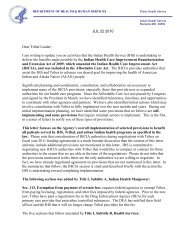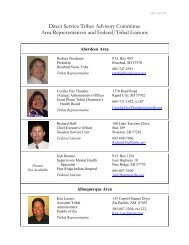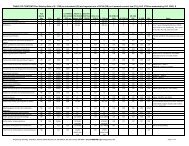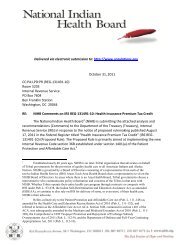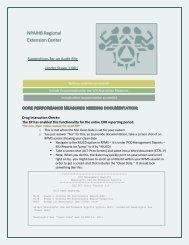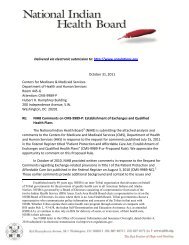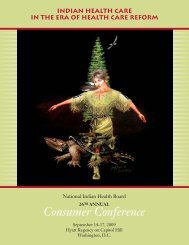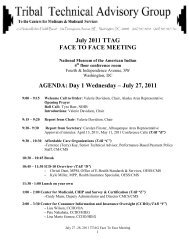mmpc - National Indian Health Board
mmpc - National Indian Health Board
mmpc - National Indian Health Board
Create successful ePaper yourself
Turn your PDF publications into a flip-book with our unique Google optimized e-Paper software.
and urban <strong>Indian</strong>s and to provide all resources necessary to effect<br />
that policy . . .” 2 .<br />
Although the Federal trust responsibility to provide health care to AI/ANs has been carried out in<br />
recent years by the <strong>Indian</strong> <strong>Health</strong> Service (as well as Tribes and Tribal organizations, operating<br />
under the <strong>Indian</strong> Self-Determination and Education Assistance Act (ISDEAA)), this<br />
responsibility is not limited to the <strong>Indian</strong> <strong>Health</strong> Service. Rather, it applies to the Federal<br />
government as a whole, and to each agency charged with administering federal health care<br />
programs.<br />
OPM has demonstrated itself as a model agency in administering the Federal trust responsibility<br />
in its implementation of the Federal Employees <strong>Health</strong> Benefits (FEHB) program option for<br />
Tribes. OPM's commitment to Tribal consultation and the resources required to getting the<br />
program up and running and available to Tribes across the country is to be commended. We<br />
hope that OPM will continue to administer the Federal trust responsibility in the Program with<br />
the same level of commitment, Tribal consultation and collaboration it has demonstrated with the<br />
FEHB program.<br />
The Unique Nature of the <strong>Indian</strong> <strong>Health</strong> System Creates Barriers to Accessing Exchange<br />
Benefits for American <strong>Indian</strong>s and Alaska Natives<br />
American <strong>Indian</strong>s and Alaska Natives have a right to health care at no cost to them, and AI/ANs<br />
who seek services from IHS and Tribal providers do not pay for those services directly.<br />
Consistent with the Federal trust responsibility, Congress has enacted laws that ensure that<br />
AI/ANs are not charged for participating in other federal health care programs. In Medicaid,<br />
CHIP and the Exchanges 3 , for example, there are no deductibles or co-pays for AI/ANs.<br />
Similarly, the ACA provides that AI/ANs are not subject to the penalties for failing to obtain<br />
insurance.<br />
Because AI/ANs can obtain care at no cost to themselves through the I/T/U, AI/ANs will be<br />
hesitant to purchase health insurance through the Exchanges. Yet Congress clearly intended<br />
Exchange coverage to be an additional vehicle for providing additional resources to the <strong>Indian</strong><br />
health care system, and Congress encouraged AI/ANs to participate in the Exchange program<br />
when it exempted most AI/ANs from cost-sharing in the Exchanges.<br />
The Congressional Budget Office (CBO) estimates that the premium exchange subsidies for<br />
qualified individuals will total $1,017 billion over the 2012-2022 period. We estimate as many<br />
as 510,000 AI/ANs will qualify for exchange subsidies as their family income falls between 138<br />
and 400 percent of the Federal Poverty Level (FPL). These tax credits are only available through<br />
the Exchanges.<br />
2 25 U.S.C. § 1602.<br />
3 All AI/AN who receive their care through an I/T/U or contract health services are not subject to cost-sharing<br />
through the Exchanges. AI/AN with incomes below 300 percent of the Federal Poverty Level who receive care<br />
from any other provider are similarly exempt from cost-sharing in the Exchanges.<br />
<strong>National</strong> <strong>Indian</strong> <strong>Health</strong> <strong>Board</strong> Page 3 of 7 October 22, 2012



